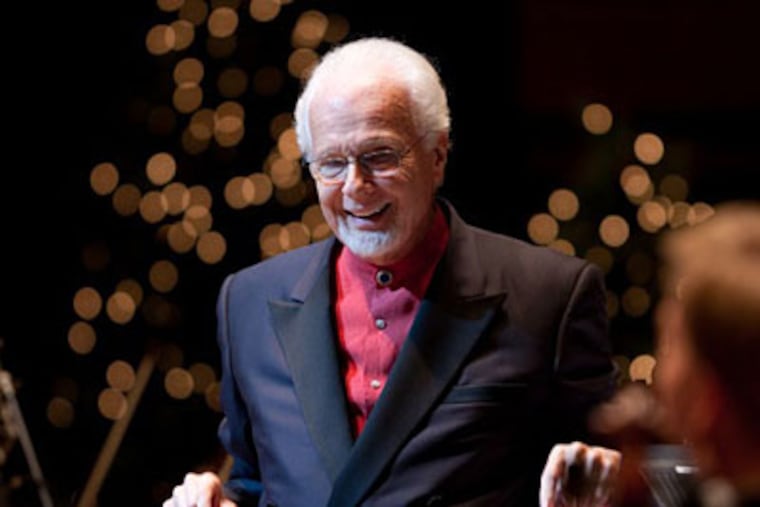Philly Pops composing its own new future
In a world of shifting musical genres and fickle audiences, what is the pops orchestra of 2012 and beyond? Our own plucky example of the ensemble species, Peter Nero and the Philly Pops, is in the process of rebuilding itself even as it ponders the question.

In a world of shifting musical genres and fickle audiences, what is the pops orchestra of 2012 and beyond?
Our own plucky example of the ensemble species, Peter Nero and the Philly Pops, is in the process of rebuilding itself even as it ponders the question.
Tuesday, to emphasize its move from offices on Broad Street to Walnut, the group puts on a dog-and-pony show with a parade of Pops musicians and Mummers - ceremony catching up with reality. The Pops split from the Philadelphia Orchestra Association in the wake of a failed five-year merger agreement brokered with the help of former State Sen. Vincent J. Fumo.
The smaller group is still, legally, in Chapter 11, swept into bankruptcy court by the Philadelphia Orchestra's ongoing reorganization. But unlike the orchestra, the Pops has no substantive issues or potential adversaries standing between it and recovery, leaders say, and expects to extricate itself from bankruptcy shortly.
Artists and repertoire are in place for 24 concerts next season. Tickets go on sale in April. Pops leaders are reassuring listeners that all concerts will happen and their money is safe: Customers, after all, buy tickets from TicketPhiladelphia, and only after a show has been performed does the Pops receive its money.
"There is absolutely no risk," says Pops president Frank Giordano.
A number of important backstage hurdles have already been cleared. The Pops, a resident company of the Kimmel Center, has negotiated a new lease agreement, winning a 40 percent reduction in its Verizon Hall rent, says Giordano, an area businessman. New staff has been hired, and the board replenished. A strategic plan is being developed. The Pops' contract with its musicians runs through August, but Giordano expects to have a new deal in place well before then.
"From our point of view, there are virtually no unresolved issues with the union," says Giordano.
For now, the Pops is continuing in much the same form as it has for more than three decades under the artistic leadership of jazz pianist/conductor Peter Nero. But there's a realization that with Nero about to mark his 78th birthday, it's time to begin a music-director search.
"There is obviously going to be a successor to Peter," says Giordano, adding that a new music director may be in place by the 2014-15 season. "Peter will be very much involved in the process."
The field of talent is not huge, but the Pops has brought in artistic administrator Evans Mirageas and marketing consultant Charlie Wade to consult on the search.
Starting in 2013-14, audiences might begin to see the Pops trying on guest conductors.
"It might take a couple of years. We're under no time pressure," says Mirageas. "We need someone who is charismatic. The music director of a pops orchestra is an entertainer as much as a musician. It needs to be someone the public will fall in love with. A pops concert is a show."
A change in artistic leadership reverberates more profoundly for the Pops than it would at most other groups. The formula that's worked here for so long is to build the ensemble around Nero - his taste in repertoire, his estimable keyboard talent, his choices in guest artists.
What this means is that the core identity of the group is suddenly in play.
"There is no way to replace Peter Nero," says Giordano. "To bring in a performer-conductor would be a mistake in my opinion. I think the alternative model is a conductor, a very good conductor, but not to be a performer-conductor, so I think we would rely more on guest soloists and artists."
Every pops orchestra is its own thing - usually cobbling together a personality from light classics, movie scores, Broadway, jazz, or hosting pop artists (such as Simon and Garfunkel and ABBA). In some cities, the pops "product line" is handled by the city's major orchestra. Such is the case in Atlanta, Dallas, Detroit, and other markets. With the Philadelphia Orchestra leaning more toward pops - at the Mann this summer, it is hosting singer Idina Menzel, whose Broadway songs are traditional Philly Pops territory - repertoire distinctions are blurring.
Nero said he's in favor of programming and artistic concepts that keep the Pops the main attraction, "with the guests as icing on the cake. The one thing I don't want to see is the orchestra as a back-up band playing in dim light. We tried that a few times and our loyal patrons were very vocal with their complaints. They want to see their orchestra."
All this means, in effect, building an organization - and, possibly, a new audience - from the ground up. After all, it is not known at the moment how many fans show up to hear Peter Nero, and how many for the Philly Pops and programming. Clearly, the name of the ensemble will have to change. When he talks about the group at this juncture, Giordano is describing an institution that, after three decades, is suddenly unsure of what it is.
He puts it this way:
"We are a start-up that's been around for 33 years."